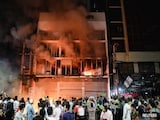The United Arab Emirates said on Wednesday that it is hosting former Afghan president Ashraf Ghani "on humanitarian grounds", after he fled his country amid a Taliban takeover.
Ghani's whereabouts had been unknown after he fled Afghanistan at the weekend in the face of a sweeping advance by the Taliban.
"The UAE Ministry of Foreign Affairs and International Cooperation can confirm that the UAE has welcomed President Ashraf Ghani and his family into the country on humanitarian grounds," the ministry said in a brief statement.
Ghani left Afghanistan on Sunday as the Taliban closed in on Kabul, before the insurgents walked into the Afghan capital unopposed.
In a Facebook post, Ghani said the "Taliban have won" and that he fled to avoid a "flood of bloodshed".
Until Wednesday, unconfirmed reports said that the 72-year-old had fled to Oman, Tajikistan, or Uzbekistan. Some even speculated that he had escaped to Lebanon, where his wife hails from.
The Taliban capped a staggeringly fast rout of Afghanistan's major cities in just 10 days, achieved with relatively little bloodshed, following two decades of war that claimed hundreds of thousands of lives.
The collapse came as US President Joe Biden moved to complete the withdrawal of US troops.
Biden admitted Monday the Taliban advance had unfolded quicker than expected but defended his decision to leave, and criticised Ghani's government.
Jake Sullivan, the US national security adviser, on Tuesday declined to answer questions about Ghani, who he said "is no longer a factor in Afghanistan".
The United States, however, has continued to refer to "President Ghani", with the State Department saying that there has not been a formal handover of power.
US-led forces invaded the country following the September 11 attacks in 2001, in response to the Taliban giving sanctuary to Al-Qaeda, and toppled them.
UAE refuge
This is not the first time that the United Arab Emirates -- an oil-rich Gulf country -- has opened its arms to former leaders and their relatives, now persona non grata in their own country.
In 2017, the emirate of Dubai hosted former Thai prime minister Yingluck Shinawatra, who was sentenced in absentia in his homeland to five years in prison.
Spain's king Juan Carlos went into self-exile in the UAE in August last year as questions mounted over the origins of his fortune, and the UAE was Pakistani opposition leader Benazir Bhutto's home during her eight years in exile before she was assassinated in 2007.
The UAE is one of three nations, including Saudi Arabia and Pakistan, which recognised the previous hardline Taliban regime, which ruled Afghanistan from 1996 to 2001.
This time around, the Taliban have sought to project an air of restraint and moderation.
Ghani was elected in 2014 on promises to remake Afghanistan.
But the former president may ultimately be remembered for making little headway against the deep-rooted government corruption that underwrote his demise.
In his last years in office, Ghani watched as he was first cut off from talks between Washington and the Taliban that paved the way for the US exit from Afghanistan, and then forced by his American allies to release 5,000 hardened insurgents to lock down a peace deal that never materialised.
Dismissed as a "puppet" by the Taliban, Ghani was left with little leverage during his final months in the presidential palace, and resorted to delivering televised diatribes that did little to improve his reputation with Afghans.
(Except for the headline, this story has not been edited by NDTV staff and is published from a syndicated feed.)















